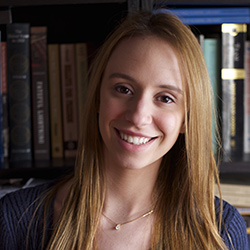Katie Sherman
Last January, Converse College’s low residency MFA program welcomed Victoria Cappello. Cappello is a New York agent with The Bent Agency. Founded in 2009, The Bent Agency has represented over 25 New York Times bestsellers. It was started by Jenny Bent, the previous Vice President of Trident Media Group, who wanted clients to benefit from the tailored support only a boutique agency could offer. Cappello spent several years learning under Bent as her personal assistant before building her own client list for the company. Now, she shares some insight into the industry, rejection, and her opinion of the MFA process.
S85: Tell me a little about yourself.
VC: After I graduated college and learned that a literary agent was a job that actually existed, I had a very focused approach. I made a list of all the literary agencies in NYC and cold-called all of them to see if any were hiring interns. Lots said no or just directed me to their websites for when their internships would be starting, after a lot of rejection, I was accepted into an internship. After that, I did one more—at an agency that had previously rejected me—and then I was recommended for an assistant position at my current agency, The Bent Agency. I started working as Jenny Bent’s assistant and after a couple of years could start building my own list.
S85: Why do writers need (or do they need) an agent? What are the benefits and pitfalls?
VC: Aside from the editorial feedback and general publishing advice you get, agents are able to maximize revenue streams for authors. We not only shop the print rights for your work but your audio rights, translation rights, film rights, etc. Even if you’re a self-published author, taking advantage of all the different subsidiary rights is very difficult to do on your own.
S85: What are some of the biggest mistakes you’ve seen from writers during the submission process?
VC: The biggest mistake is talking too much of yourself and not enough about the project. The bulk of your query letter should be dedicated to describing the story. When talking about yourself, keep it limited to your relevant experience. I also frequently notice that writers don’t do sufficient research on the agents they’re querying. Before you hit send, make sure the agent you’re reaching out to represents your genre.
S85: What advice do you have for writers regarding their cover letter?
VC: Start with the hook, give a brief synopsis of the story that will leave the reader wanting to know more and to keep your bio short and to only include relevant information. Don’t forget your comp titles—they’re a great way to say a lot about your book without taking up a lot of space. Also, every agent likes their submissions formatted a particular way, all of which is dictated on their website. Follow their submission guidelines.
S85: Who are you currently reading?
VC: I am currently reading Margaret Atwood’s The Handmaid’s Tale. The writing is obviously gorgeous but the reason I love it so much is how imaginative the world building is. Atwood created such an absorbing world that fascinated me to no end.
S85: What’s your take on the MFA process?
VC: I think it’s an extremely helpful process for developing writers and certainly helps produce a higher class of literature. Not only is it immeasurably helpful to be able to study under accomplished authors for whom you want to emulate, but the community it fosters of peers who you can share your work with and get feedback on, I think, is beneficial.
S85: Many people shy away from the art of short stories because they don’t sell as well. Do you believe this?
VC: They are a difficult sell but there is certainly a market for them. I think the most important part in making a short story collection marketable is making sure it’s cohesive. A collection shouldn’t be just the last ten stories you’ve written but should be thematically linked. I do represent authors who have written short stories and are working on short story collections. I also recommend getting as many short stories in the collection published by literary journals. There are a lot of awards for short stories by new writers that agents keep their eye on and anthologies for the best short stories that are sent to literary agencies.
S85: What’s your advice to writers on handling rejection?
VC: To remember that everyone gets rejected in this business. Authors are rejected by agents, yes but agents are also rejected by authors who have more than one offer of representation. Agents also face rejection with you when they submit your manuscript on your behalf. And then editors are also rejected when authors go with another publisher for their work. This business is frighteningly subjective so rejection is just part of the game.
About the Agent
 Victoria Cappello was born and raised in Queens, NY, and graduated from the City University of New York, Queens College. Before joining The Bent Agency, she completed internships at Serendipity Literary and Carol Mann Agency. She now lives on Long Island. She is looking for both commercial and literary fiction as well as young adult titles. Her favorite genres are historical fiction, suspense, mysteries, upmarket women’s fiction, and romance.
Victoria Cappello was born and raised in Queens, NY, and graduated from the City University of New York, Queens College. Before joining The Bent Agency, she completed internships at Serendipity Literary and Carol Mann Agency. She now lives on Long Island. She is looking for both commercial and literary fiction as well as young adult titles. Her favorite genres are historical fiction, suspense, mysteries, upmarket women’s fiction, and romance.
About the Interviewer
 Katie Sherman is a freelance journalist in Charlotte, NC. She is currently pursing an MFA degree at Converse College. She has an affinity for Southern Gothic literature, cider beer, Chicago, and morning snuggles with her girls — Ella and Addie.
Katie Sherman is a freelance journalist in Charlotte, NC. She is currently pursing an MFA degree at Converse College. She has an affinity for Southern Gothic literature, cider beer, Chicago, and morning snuggles with her girls — Ella and Addie.
